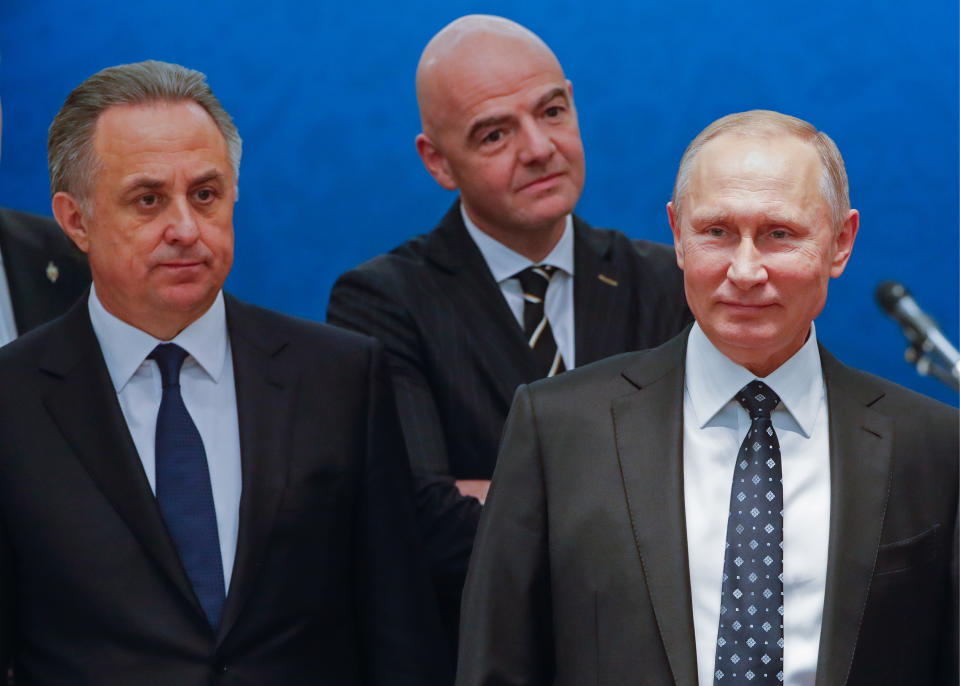What does Russia's Olympic ban mean for 2018 World Cup?
The International Olympic Committee dropped its unprecedented bombshell on Tuesday, banning Russia from competing as a nation at the 2018 Winter Olympics. A 14-person IOC panel ruled that Russia’s state-sponsored doping and subsequent cover-up constituted “systematic manipulation” of doping rules, and therefore deserved the extraordinary punishment.
The IOC also decided to “exclude” Vitaly Mutko, Russia’s minister of sport, from all future Olympic competitions. In other words, Mutko – also the head of the 2018 World Cup organizing committee – is banned for life.
But the IOC later deflected one of the many follow-ups to its announcement: What about doping in Russian soccer? What about the country’s controversial hosting of the World Cup?
At a news conference in Lausanne, Switzerland, IOC head Thomas Bach and disciplinary commission leader Samuel Schmid answered those questions by shifting the onus onto FIFA. Bach refused to comment on FIFA. Schmid said: “We only drew conclusions on evidence that was corroborated with proof.”
'This does not mean (evidence) is erroneous.' Basically implies FIFA needs to sort out the accusations of doping in soccer if it wants conclusive answers there.
— Andrew Das (@AndrewDasNYT) December 5, 2017
The World Anti-Doping Agency’s 2016 investigation revealed that soccer had been among the sports protected by Russia’s cover-up. Documents from the investigation claimed that members of Russia’s 2014 World Cup team would have been among those protected, if they tested positive before the tournament.
This past summer, British media reported that all 23 players on Russia’s 2014 World Cup squad were being investigated by FIFA. The 23 were among 34 Russian soccer players under investigation. “FIFA officials possess a dossier of detailed evidence and intelligence about the players,” the Daily Mail wrote. “What action they are taking, if any, is so far unclear.”
FIFA later said that it was “still investigating the allegations involving football players in the so-called McLaren report.”
Prior to the 2018 World Cup Draw last week, FIFA general secretary Fatma Samoura said, “From the information we have, we cannot talk about widespread doping in football in Russia.”
Mutko responded to questions about doping by referencing Russia’s on-field performance at the 2014 World Cup, where it did not win a game “If we play like that while doped, then how would we do without?” he said. “It’s absolute stupidity.”
In the wake of the IOC’s decision, FIFA issued a statement saying that “the decision has no impact on the preparations for the 2018 World Cup.” It reiterated that it was investigating the allegations from the McLaren Report, that it was collaborating with WADA, and that it had been in contact with Richard McLaren himself.
The FIFA statement continued: “Should there be enough evidence to demonstrate the violation of any anti-doping rules by any athlete, FIFA would impose the appropriate sanction. On the other hand, it should be stressed that sanctions cannot be imposed based on the mere suspicion or limited facts.
“The procedure for the handling of evidence contained in the report by the respective sports federations was set by WADA in February 2017 and further guidance was provided very recently, acknowledging that there may not be sufficient evidence to sanction individual athletes.
“Although it is in FIFA’s interest that such procedures are finalized as early as possible, thorough investigations take time, as demonstrated by the IOC investigation, which only started to produce results recently.”
The 2018 World Cup kicks off June 14 in Moscow.
More to come shortly.

– – – – – – –
Henry Bushnell covers soccer – the U.S. national teams, the Premier League, and much, much more – for FC Yahoo and Yahoo Sports. Have a tip? Question? Comment? Email him at henrydbushnell@gmail.com or follow him on Twitter @HenryBushnell.



